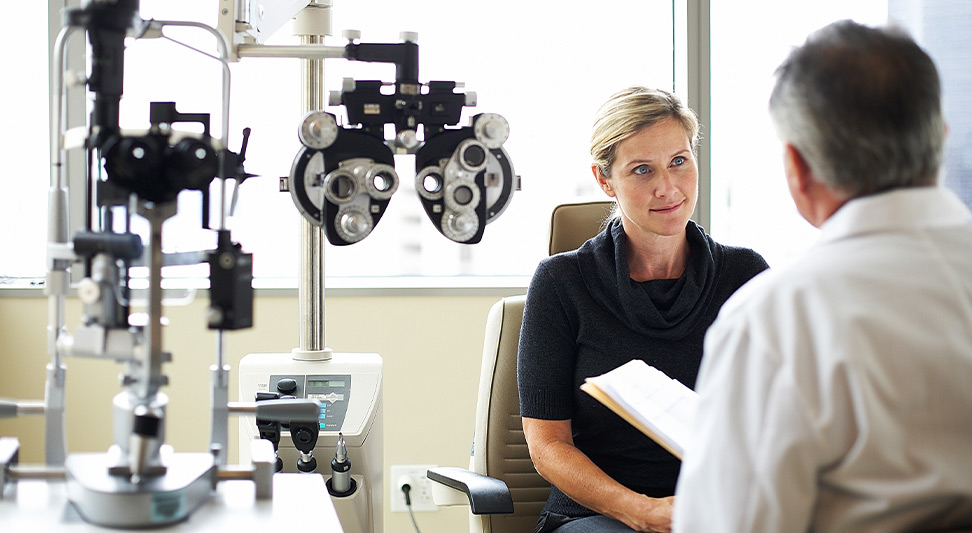As we bid farewell to a sweltering summer and shift our attention to the coziness of fall, remember to spend some time focusing on your own health and well-being. September is Healthy Aging Month, and it’s the perfect time to remind adults over the age of 45 about the importance of healthy lifestyles AND healthy eyes. So, let’s dive into some friendly tips on how to keep yourself and those peepers healthy and young!
What’s Healthy Aging Month All About?
September marks Healthy Aging Month, an annual reminder encouraging us to prioritize our overall well-being as we grow older. This awareness month was initiated in 1992 by Carolyn Worthington, the president of the Educational Television Network and publisher of Healthy Aging®. Worthington and Healthy Aging’s influence led the Senate to pass a resolution in 2021 designating September as National Healthy Aging Month.
Healthy Aging Month is aimed at folks aged 45 and beyond, as this is when many older adults start noticing changes in their vision. The National Eye Institute (NEI) and National Eye Health Education Program (NEHEP) are using Healthy Aging Month to spread the word about ways to prevent vision loss and support healthy aging.
The Link Between Eyes & Body

It’s common knowledge that the state of your overall health can impact your eyes. For instance, neglecting your health and developing conditions like diabetes can lead to various eye problems. But you might not realize that your eyes can also reveal vital information about your overall health.
Conditions such as tumors, aneurysms, autoimmune disorders, and even neurological issues like Parkinson’s disease can have signs detectable in your eyes. Additionally, hypertension, diabetes, and even cancer can leave their mark on your eye health. So, taking care of your eyes isn’t just about seeing clearly; it can also help spot potential health issues.
Aging and Your Eyes
Our vision plays a crucial role in our daily lives, but just like the rest of our bodies, our eyes go through changes as we age. Many adults over 40 find it harder to read up close, distinguish colors, or adjust to changing light conditions. They’re also more prone to age-related eye issues, such as:
- Cataracts – These cloudy areas in the lens of the eye can cause blurry vision. Fortunately, cataract surgery is a common and safe option.
- Glaucoma – Excess fluid pressure in the eye can lead to vision loss or blindness if left untreated. Early detection through annual eye exams is key.
- Presbyopia – Gradual loss of the ability to focus on small print or objects up close can be remedied with reading glasses or lens replacement surgery.
- Dry Eye – Tear gland dysfunction can cause discomfort but can be managed with various treatments.
- Diabetic Retinopathy – Blood vessel leakage in the retina can affect vision, particularly in those with diabetes. Regular eye exams and diabetes management are crucial.
- Age-related Macular Degeneration (AMD) – This disease can result in blurry central vision. Treatments include injections and light therapy.
Maintaining Healthy Eyes as You Age

Keeping your eyes in tip-top shape doesn’t have to be a chore. Taking care of your overall health often leads to healthier eyes. Here are some simple steps that can significantly impact your eye health.
- Regular Eye Exams – Schedule comprehensive eye exams regularly to catch any issues early on.
- Sunglasses – Protect your eyes from UV rays by wearing sunglasses.
- Healthy Diet – Eat nutrient-rich foods like leafy greens, colorful vegetables, proteins, and foods high in Omega-3 fatty acids to support eye health.
- Ditch Bad Habits – Quit smoking, cut down on sugar, and limit alcohol intake to benefit both your overall and eye health.
- Stay Active – Incorporate a healthy lifestyle into your daily routine, including self-care, good nutrition, and staying active.
Don’t Avoid Your Optometrist or Vision Problems
In the spirit of Healthy Aging Month, take charge of your overall health and give your eyes some well-deserved attention. If you haven’t had a comprehensive eye exam lately, it’s time to schedule one with an optometrist.
At nJoy Vision, we treat two of the most common vision issues associated with aging — presbyopia and cataracts. Call 405-842-6060 to schedule an nJoy Vision appointment if you suspect you have one of these conditions or have been diagnosed with one. We will assess your eye health, determine the severity of your vision problem, and discuss the following treatment options.
Lens Replacement
Lens replacement, also known as refractive lens exchange and custom lens replacement, corrects vision problems by replacing the natural lens with an artificial one called an intraocular lens (IOL). This procedure uses the same femtosecond laser technology as LASIK but does not alter the cornea’s shape or thickness. As they age, lens replacement patients will not experience vision regression or develop cataracts.
There are so many advanced lens implant options that can be customized to suit specific vision and lifestyle needs. This makes Lens Replacement at nJoy Vision an ideal option for those over 40 with presbyopia who want to reduce or eliminate their reliance on reading glasses.
Laser Cataract Surgery
nJoy Vision was the first laser vision center in Oklahoma to perform laser cataract surgery with the CATALYS® Precision Laser System, and we still use this revolutionary platform today. This advanced technology uses 3D imaging and precision laser technology to ensure a gentler, faster procedure with minimal discomfort.
Just like lens replacement, laser cataract surgery at nJoy Vision allows you to tailor your treatment with the IOL option that best suits your lifestyle and vision correction needs.
Make Healthy Aging Month a Forever Focus

Healthy Aging Month doesn’t have to end on September 30th. Starting now, you can make a lifelong commitment to care for your eyes and embrace the journey of aging with grace and vibrant vision!
Call (405) 842-6060 to Schedule an nJoy Vision Laser Cataract or Lens Replacement Consultation

